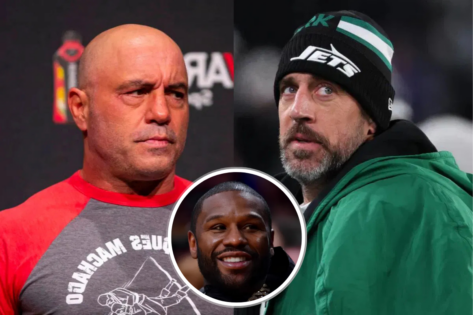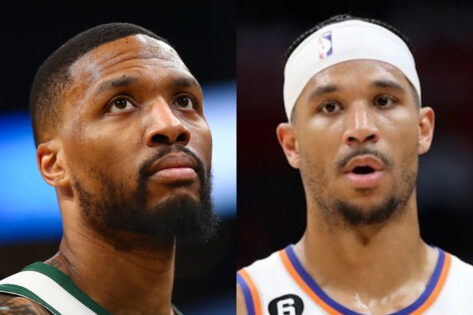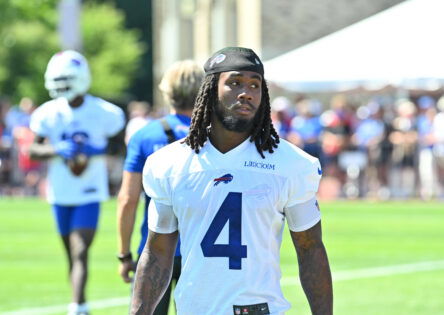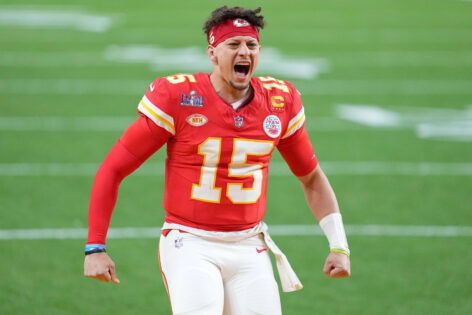There’s something wrong with how we learn about UFC pay-per-view figures these days. It used to be impossible to avoid those stats—everyone was familiar with them, they sparked debates, and they served as the final scoreboard for how big a fight really was. But lately, those statistics have gone quiet, almost as if they’ve been locked up. Fans and insiders are gossiping about this sudden blackout. Why the secrecy? That very question was raised on a recent edition of the Joe Rogan Experience, featuring none other than NFL star Aaron Rodgers.
What began as a casual conversation on JRE #2325 rapidly evolved into a major eye-opener for fight fans. Aaron Rodgers asked Joe Rogan about the current average UFC pay-per-view figures. The JRE was honest—he didn’t. He even questioned if the statistics were still being shared, claiming they were once public but have now vanished. And that is when Rodgers made a striking comparison between the UFC and boxing, where pay-per-view purchases have long been considered a badge of pride.
While Joe Rogan admitted that the UFC used to reveal the figures back in the day, Aaron Rodgers emphasized how boxing has always been unique, stating, “Boxing would all the time as like kind of a badge of honor. You know, there’s two points—like Floyd would do, you know…” The UFC commentator chimed in with some perspective: “Four million for the Conor McGregor fight. It was something crazy like that. That was one of the records. And then the Manny Pacquiao fight, I think, was the biggest one ever.”
When the UFC regularly shared its pay-per-view figures, it was an important element of the sport’s image. Huge fights, such as UFC 229 between Khabib Nurmagomedov and Conor McGregor, reportedly drew over 2.4 million buys, the biggest ever for the UFC. Dana White frequently mentioned these stats proudly, and they were a hot topic among fans and media alike.
However, since the UFC signed an exclusive agreement with ESPN and shifted much of its content to the ESPN+ streaming service, that data has all but vanished from public view. Both the UFC and ESPN no longer provide specific buy numbers, leaving many fans wondering what’s going on behind the scenes. Some sources believe ESPN pays UFC a fixed minimum for pay-per-view events regardless of actual sales, which could explain why transparency has declined.
MMA: UFC 274 – Weigh Ins, May 6, 2022 Phoenix, Arizona, USA UFC announcer Joe Rogan during weigh ins for UFC 274 at the Arizona Federal Theatre. Mandatory Credit: Mark J. Rebilas-USA TODAY Sports, 06.05.2022 15:07:43, 18218608, NPStrans, UFC, Joe Rogan, MMA PUBLICATIONxINxGERxSUIxAUTxONLY Copyright: xMarkxJ.xRebilasx 18218608
This transformation has an impact on how fans connect with the sport, not only in terms of numbers. When pay-per-view purchases became public, they served as a tool for evaluating the excitement and success of individual events. Without that clarity, it is difficult to determine the UFC’s real commercial standing.
Boxing, on the other hand, continues to openly celebrate its pay-per-view records, with Floyd Mayweather in particular making a point of bragging about those record-breaking statistics. UFC’s secretive strategy keeps fans guessing, and many believe they are missing a crucial piece of the jigsaw. However, it may change if the UFC finds a new home on other platforms such as Netflix. But what are the odds of that happening?
Joe Rogan gives an idea of the UFC-Netflix situation
Building on the mystery surrounding UFC pay-per-view figures, the JRE host and Rodgers began discussing where UFC could go next with streaming. The possibility of UFC appearing on Netflix was brought up, and Joe Rogan was candid about how difficult it could be. He mentioned the Mike Tyson-Jake Paul bout, which Netflix streamed without charging extra, as part of the basic subscription. So, the UFC commentator wondered, if the UFC went there, would fights still be pay-per-view?
Because if it’s just on Netflix like any other show, how will the high-stakes conflicts work? To fix this, Aaron Rodgers surely has an interesting thought: What if the UFC charged only $5 for a single fight instead of $70? It’s a totally different way to think about the business, and it made both of them question if reduced rates and more viewers could be the future.
Especially Joe Rogan, as he said, “Yeah, I don’t know. Well, that’s a good question, right? Like, if the UFC was $5 instead of $70, would you actually make more money because you get millions of downloads or millions?” The UFC and WWE are both owned by the same parent company, and WWE already has a large relationship with Netflix, so it appears to be an ideal fit.
But the real question is whether UFC’s traditional pay-per-view model can fit into Netflix’s environment. It’s a riddle, but if they solve it, watching UFC may look completely unique—and possibly a lot better—for fans. What do you think? Will Dana White be able to pull off a deal with Netflix? Let us know in the comments.
The post Joe Rogan & Aaron Rodgers Debate UFC’s New Lack of Transparency During Floyd Mayweather PPV Conversation appeared first on EssentiallySports.



